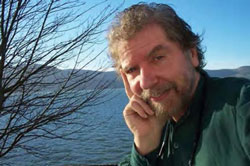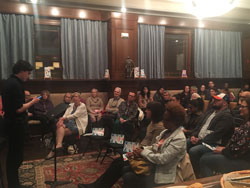Visiting writer Jane Wong came to Monmouth University via Zoom on March 22 to read and talk about her book of poetry, How to Not Be Afraid of Everything (2021). Jane Wong is also the author of Overpour (2016). Her poems and essays can be found in places such as Best American Nonrequired Reading 2019, Best American Poetry 2015, American Poetry Review, POETRY, AGNI, Virginia Quarterly Review, McSweeney’s, and Ecotone.
A Kundiman fellow, Wong is the recipient of a Pushcart Prize and fellowships and residencies from Harvard’s Woodberry Poetry Room, the U.S. Fulbright Program, Artist Trust, the Fine Arts Work Center, Hedgebrook, and others. She is an Associate Professor of Creative Writing at Western Washington University.
Hosted by Miheala Moscaliuc, Ph.D., Associate Professor of English and the M.A in English Program Director, students and faculty were invited to ask the author questions after a short interview and reading.
In celebration of her family journey during the Great Leap Forward, Wong took readers on a journey through her understanding and reflection of Chinese culture and its impact on her immediate family and ancestors through this collection of poetry. She began the reading, reciting the poem “An Altar,” an incantation and meditative poem of setting the “altar” for her ancestors to tell their stories. It also sets the stage for the discussion of cultural and political imbalances during the Great Leap Forward.
Before the reading began, Wong explained that the reading will be structured in three sections, with each section displaying a new photo from her childhood that coincides with the context of the poems she was reading. Because the collection is also broken up into three sections, she emulated the same meditation that her poems do on the page, orally. Because of this, guests were able to not only give a better understanding of Jane as the character of this story, but also Jane as the poet and her process of writing this collection.
Throughout the reading, Wong defined herself as a “restaurant baby,” stringing together life as a daughter of a restaurant owner and operator, to the trauma, hardship, and dysfunction of being a part of a business family. Wong expressed that although she did not intend on writing about food, and even tried to run from it, she felt that food (and the culture surrounding it) had to be addressed in her poetry because it is a part of who she is as a person.
The incorporation of food into her poems has impacted Wong in ways that make her appreciate her childhood and her heritage. She described that her relationship with food is different now that has weaved the impact that food has had on her life and that of her ancestors during The Great Leap Forward. Because of this, food is now a symbol for so much more. It is a link to her family, her ancestors, and the people she loves and expresses in this collection.
The final poem she read, “After Preparing The Altar, The Ghosts Feast Feverishly,” Wong as the speaker is metaphorically sharing her food of life with her family. They are eating together as if they were still alive. The poem itself contains layers, different voices in the poem, that shape its meaning and understanding of what it means to be hungry. Wong claims that during the process of crafting this poem, she believed that her ancestor wrote it for her. The recognition that she gave to the traumatic event of The Great Leap forward, and also her admiration for the ones that came before her, can be inferred that every one of these poems were co-written by her ancestors.
The next visiting writer will be novelist Rivka Galchen, the recipient of a William Saroyan International Prize for Writing and a Rona Jaffe Foundation Writers’ Award, on April 14 at 5 p.m. at the Erlanger Gardens.



